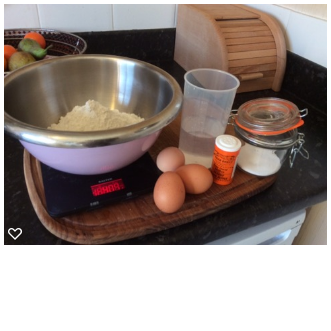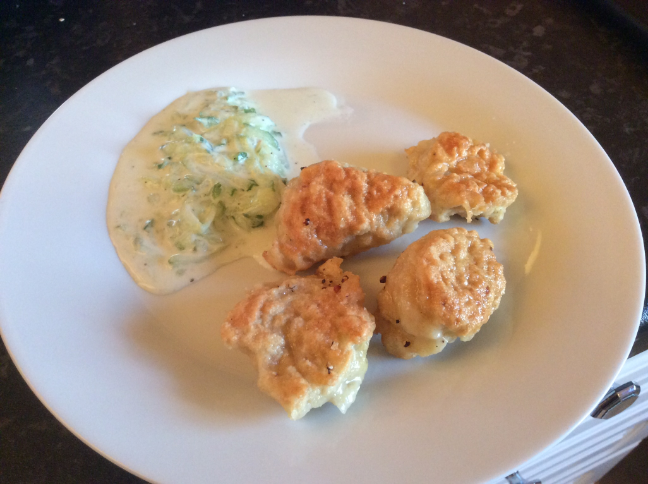The story
Whenever I think of this recipe for German dumplings, thoughts of my friend Carla pop up in my mind. She is my neighbour and has been my best friend since we were two.
When we were in Primary School together, she wrote that her favourite food was “Mehlklöße”. The things is, she spelt it incredibly badly, making three spelling mistakes in just this one word! So whenever I say the name of this dish, I would always pronounce it wrongly on purpose.
I cook it in Scotland quite often, because the child I take care of really likes it, much like most children do.
The language
Rosa uses some important verbs in her story about why she loves this dish:
1. …thoughts of my friend Carla pop up in my mind.
2. …making three spelling mistakes…
She also uses an important combination of common words to make a comparison:
3. …much like most children do.
1. …thoughts of Carla pop up in my mind
Using pop up in this way helps Rosa explain the suddenness with which the thoughts appear. When using this phrasal verb, you are emphasising that something appears or happens very suddenly, or even unexpectedly.
- The error message just popped up on my screen!
- That cat pops up in our garden once or twice a week.
- He’s like a ghost that pops up when you least expect him.
Language task: What images or thoughts pop up in your mind when you think of your favourite food?
2. …making three spelling mistakes…
This sentence uses a form of make, rather than do. In English, I did a mistake is not correct. The two verbs are very similar, and many other languages have one verb to express both ideas. However, many learners of English still get the two mixed up. In exams, incorrect use of make is one of the most typical lexical errors.
Collocations in Use (Cambridge), has an entire unit dedicated to the differences between these two common words.
Language Task: 1) Have you ever made mistakes when cooking? What excuses, if any, did you make? Did people make comments? 2) Have you made an effort to cook anything from another country recently? Did you do your best to get the authentic ingredients? 3) In your home, who does the food shopping? Have you ever made the decision to buy from a different supermarket or shop? Do you think shopping at supermarkets does harm to local shops?
3. …much like most children do.
Here, Rosa uses like to make a comparison. We use this quite often in English. She also adds other words (much and do) to make quite a sophisticated comparison.
- Our neighbours use their car for commuting, much like we do.
- Sam works in education, much like Moe does.
You can also use this in the middle of a sentence, with a slightly different structure.
- I give my dogs fresh food, much like I do my cats.
- Those countries have an open border, much like Spain does with France.
In all the examples above, do is used to reduce repetition.
Language task: Make a list of different ingredients that you like and don’t like using. Then, compare your list with someone else. For example, I love using basil, much like Tom does.
The recipe
For the dumplings

For the salad
- 2 cucumbers
- 2 tbsp plain yoghurt
- 2 tbsp sunflower oil
- 1 tbsp vinegar
- salt and pepper, to season
- Mix the flour with the eggs and gradually add the water until you get a stretchy dough.
- Bring a large saucepan of salted water to the boil, and add spoonfuls of the dough. You can make them as large or small as you like.
- Boil them for around seven minutes, then drain in a sieve.
- While waiting for step 3, grate the cucumbers, and mix them with the yoghurt, oil and vinegar. Season to taste.
- Heat some oil and fry the klöße for a few minutes, until slightly golden on the outside.
- Serve together with the salad. Delicious!
